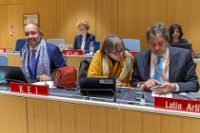July 23, 2012. Broadcasting organizations (and MPA) views on why they need a treaty
July 23, 2012. Broadcasting organizations (and MPA) views why they need a treaty
I am not sure if the best film analogy here would be Groundhog Day or The Bridge on the River Kwai but the following NGOs are re-affirming that they need a treaty because:
1. there is a piracy problem that can be fixed by giving them more exclusive rights for 20 years
2. the Internet treaties trilogy: there is a WCT and a WPPT so there has to be a WBT. To be fair.


